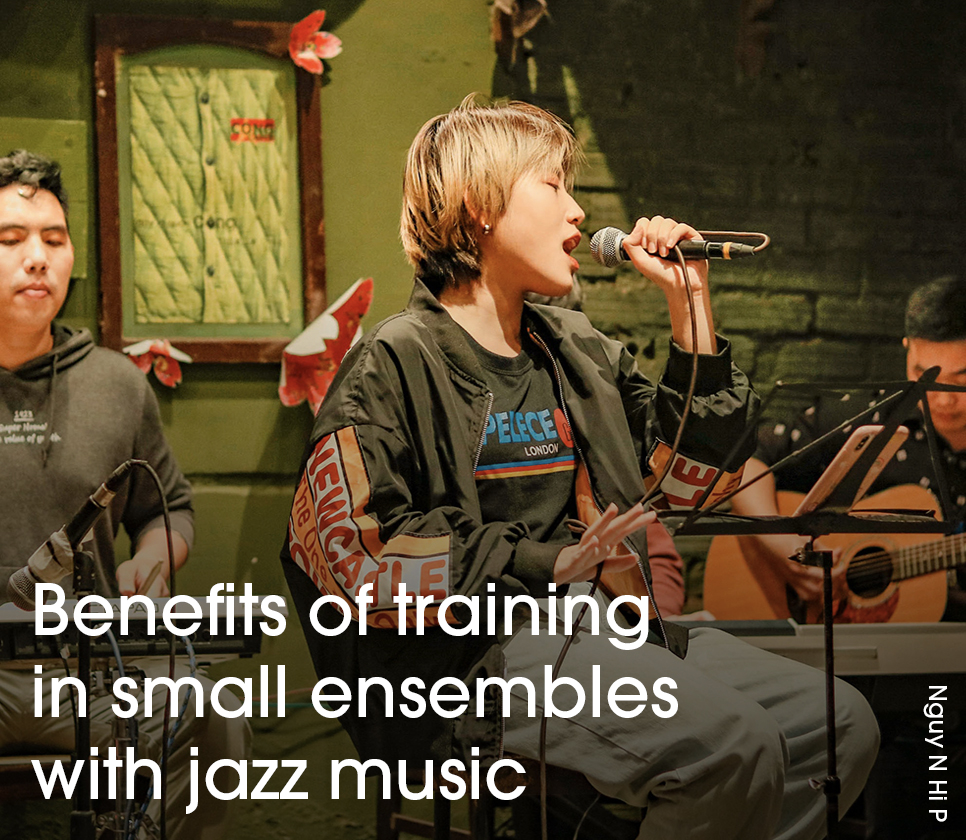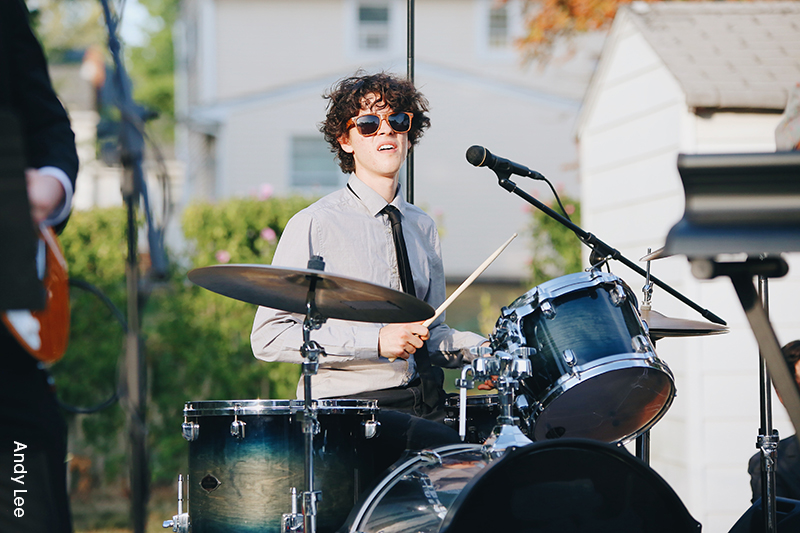
Notes on Conducting Jazz Ensembles
Listening, Imitation, Improvisation, Cultural, Personal and Historical Awareness
By David Berger (highlights)
The universal love of jazz and its identification with America is about the personal freedom of expression and democracy in action. In order to be a responsible citizen, we need to be educated and articulate. This is especially true in being a member of a jazz band, which is a democratic musical society. Your first responsibility as a member is to understand the musical arrangements. Although the conductor is the final arbiter of taste, each player should bring as much understanding and personal expression as possible.
Knowledge comes from listening and playing experience. Jazz was traditionally learned by going on the road with big bands, where you learned from the older players. Learning to play jazz in school is a poor substitute, since there is only one older player (the teacher), and he can’t play lead in each section.
When we learned to speak, we imitated our parents, then intuitively learned how to put ideas together long before we ever studied reading, writing and grammar in school. Jazz should be the same. Listen, imitate, then create. Without listening and a certain mastery of imitation, creation is uninformed and artificial. You don’t just make up language—it must be heard and internalized before you form and say profound thoughts.
Understanding how jazz represents us as Americans is important. When I first became aware that jazz was different from other music, I was 12 years old and immediately felt it was my music. It expressed how I felt, walked, talked, thought and breathed. As an adult, I came to realize that there are no wrong notes for me. Oh, some are better choices than others, but I can go many different ways with it. It’s like when you are having a conversation; you can form your sentences many ways and change the subject or go into more depth, etc. Our students are musical toddlers – they need encouragement and gentle corrections to find their own voices.
DOWNLOAD FULL ARTICLE: https://academy.jazz.org/ee/wp-content/uploads/2014/11/David-Berger-On-Conducting-Jazz-Ensembles-edited.pdf
Benefits of studying jazz?
Jazz is an art form that allows you to find out a piece of who you are through the music, which resonates with you and informs the way you choose to perform it. The individualistic nature of jazz makes it an incredible medium of self-expression; other music forms don’t provide the same level of freedom.
When improvising, the parts of our brain that allow us to express ourselves become more active and the part responsible for self-inhibition and control become dormant. By inhibiting the mind’s self-criticism, we’re able to learn to let go and create “in the zone.” The creative brain develops over time; it’s not fixed at birth, so studying jazz directly develops your overall creativity.
“A player has to engage the brain in multiple ways that classical musicians do not. First, there are added technical requirements, such as playing blue notes, swinging eighth notes, and unusual time signatures like 12/8 and 5/4 or complex African or Latin rhythms. Then there is the huge challenge of improvisation, which is basically composing on the fly. When improvising, there is a safety net of knowing the proper chord structure and melody, but players have to have a huge musical vocabulary and realize in milliseconds what new notes will fit. They also have to listen hard so they can interact properly with what others in the band are playing. The “call and response” paradigm in jazz is actually musical conversation. I can’t think of anything more mentally demanding, especially for youngsters in early stages of learning music. Early middle school is a particularly time-sensitive period for mental development, and I suspect that middle school jazz bands can have disproportionate beneficial effects on brain development.”
from the book, Mental Biology, by neuroscientist, William R. Klemm Ph.D.
Jazz musicians respond faster to unexpected changes than others, including classical musicians. So, studying jazz trains you to expect the unexpected.

And, there’s more…
1. Enhances fine motor skills. Motor function is the ability to use small, acute muscle movements to write, use a computer, and perform other physical activities essential for classroom learning. The parts of the brain associated with sensory and motor function are developed through music instruction; musically trained children have better motor function than non-musically trained children (Forgeard, 2008; Hyde, 2009; Schlaug et al., 2005).
2. Prepares the brain for achievement. Complex math processes are more accessible to students who study music because the same parts of the brain used in processing math are strengthened through a musical practice. For example, students who take music in middle school score significantly higher on algebra assessments in ninth grade than their non-musical counterparts, as their brains are accustomed to performing the processes used in complex math (Helmrich, 2010).
3. Fosters superior working memory. Working memory is the ability to mentally hold, control and manipulate information to complete higher order tasks, such as reasoning and problem solving. Musicians are found to have superior working memory compared to non-musicians. Musicians are also better able to sustain mental control during memory and recall tasks, most likely as a result of their long-term musical training (Berti et al., 2006; Pallesen et al., 2010).
4. Cultivates better thinking skills. Thinking skills such as abstract reasoning are integral to students’ abilities to apply knowledge and visualize solutions. Studies have shown that young children who take keyboard lessons have greater abstract reasoning abilities than their peers, and these abilities improve over time with sustained training in music (Rauscher, 2000).
5. Sharpens student attentiveness. The ability to pay attention—visual focus, active listening and staying on task—is essential to school performance. It begins to develop early in life and is continually refined. Early childhood training in instrumental music improves these attention abilities, while continued music education throughout adolescence reinforces and strengthens them (Neville et al., 2008). Attentiveness is an essential building block of engagement, a competency necessary for success in school and the workforce.
6. Strengthens perseverance. Perseverance is the ability to continue towards a goal when presented with obstacles. It is developed and strengthened through music education. Students involved in music lessons surpass their peers on tasks measuring perseverance. At the foundation of perseverance are motivation, commitment and persistence, all traits of creative individuals (Scott, 1992).
7. Equips students to be creative. Employers identify creativity as one of the top five skills important for success in the workforce (Lichtenberg, Woock, & Wright, 2008). Music education helps develop originality and flexibility, which are key components of creativity and innovation. Graduates from music programs report that creativity, teamwork, communication, and critical thinking are skills and competencies necessary in their work, regardless of whether they are working in music or in other fields (Craft, 2001; SNAAP, 2011).
8. Supports better study habits and self-esteem. A study of music majors found that they felt more prepared for success in college than non-music majors. This readiness may be due to the music majors’ discipline and focus developed via intense practice and performance routines prior to college. These habits are typical of music students and may generalize to other academic areas and social/ emotional aspects of life, contributing to higher self-esteem and success (Chesky et al., 1997).
Source: https://jazzandcreative.com/whystudyjazz
Playing in ensembles and regularly performing helps develop a sense of team spirit that is not achieved in private music lessons. Playing music in a group helps develop music skills, as well as provides a support system among the kids as they work together and encourage each other.
International Academy of Jazz San Diego offers small ensemble jazz music training for young musicians aged 10-18, as well as adults. Contact us today to learn more about our programs, including online classes!
